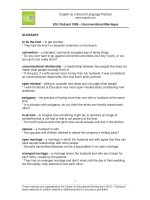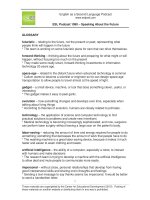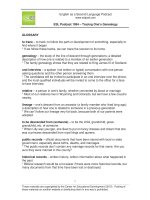ESLPod 1120 guide Want to be Fluent in English?
Bạn đang xem bản rút gọn của tài liệu. Xem và tải ngay bản đầy đủ của tài liệu tại đây (93.84 KB, 9 trang )
English as a Second Language Podcast
www.eslpod.com
ESL Podcast 1120 – Breaching a Contract
GLOSSARY
contractor – a person who provides or coordinates services, especially for a
construction or remodeling project
* The contractor said he’d finish the bathroom addition within one month, but it
has already been two months and it doesn’t look anywhere close to being
finished.
to install – to put a structure or piece of equipment in place and connect it to
other devices so that it works properly
* If you buy your home theater here, our technicians will help you install it when it
is delivered.
to dodge – to avoid someone or something; to find a way to not deal with
someone or something
* A good customer service representative never dodges a customer’s complaints,
but instead says, “I’m so sorry that happened. What can I do to fix the problem?”
to pay (someone) in full – to pay the full amount due to a person, often before
the product or service has been delivered; to pay 100% of the amount owed
* Never pay a plumber in full until you’re completely satisfied with his or her work.
breach of contract – a violation of the terms and conditions of a legal
agreement, especially one that could lead to an early end to the agreement
* Failing to give a tenant 30 day’s notice is a breach of contract.
recourse – something one can do in a difficult or challenging situation, but not
one’s first choice of action
* If you disagree with the city’s decision on your application, your only recourse is
to appeal to the state governor.
to take (someone) to court – to sue someone; to file an official complaint
against someone in a court of law, especially with the expectation of receiving
money
* The child actress took her parents to court, saying that they kept too much of
her earnings for themselves.
to settle (something) out of court – to find a solution or reach an agreement
without involving an official legal decision made by a judge
* The company was accused of selling dangerous cars, but it settled out of court
with drivers for an undisclosed amount.
1
These materials are copyrighted by the Center for Educational Development (2015). Posting of
these materials on another website or distributing them in any way is prohibited.
English as a Second Language Podcast
www.eslpod.com
ESL Podcast 1120 – Breaching a Contract
I don’t blame you – a phrase meaning that one understands another’s position
or statement, but may not fully agree with it
* I don’t blame you for being angry. If I were in your position, I would feel the
same way, but it is always better to forgive and move on.
to hide out – to hide; to stay away from other people and not allow oneself to be
found, especially because one has done something wrong and does not want to
deal with the consequences
* The criminals are hiding out, but the police will find them eventually.
to wash (one’s) hands of – to refuse to be involved in something or accept
responsibility for it; to indicate that one has nothing to do with something
* If you make this decision on your own, I wash my hands of all responsibility for
what happens next.
to sue – to take someone to court; to ask a court of law to make an official
decision about whether one has broken the law
* The police officer was sued for threatening an innocent member of the
community.
to compel – to persuade; to make someone do something, or to present a
convincing reason for someone to do something
* What compelled you to put all of your savings into this untried business?
all the more reason – an even better or more persuasive reason or motivation
for doing something
* A: It’s going to take forever to clean the garage – it’s so disorganized!
B: That’s all the more reason to start early tomorrow morning.
attorney – lawyer; a person who has studied the law and represents people and
organizations in legal matters
* When their baby was born, they worked with an attorney to write a will.
to collect damages – to receive money as compensation for another person’s
harmful or damaging actions as a result of a legal decision
* Tenants are rarely able to collect damages from landlords who don’t refund
their security deposit, because the cost of taking them to court is much higher
than the security deposit itself.
divorce – the legal end to a marriage
* They stayed married for 20 years, but as soon as their children moved out of
the house, they filed for divorce.
2
These materials are copyrighted by the Center for Educational Development (2015). Posting of
these materials on another website or distributing them in any way is prohibited.
English as a Second Language Podcast
www.eslpod.com
ESL Podcast 1120 – Breaching a Contract
COMPREHENSION QUESTIONS
1.
a)
b)
c)
What was the contractor’s breach of contract?
She didn’t sign the contract.
She didn’t complete the work she was paid for.
She took too long to finish the work.
2.
a)
b)
c)
What does Antonin mean when he says, “I’m a divorce attorney”?
He isn’t licensed to practice in the state where Sandra lives.
His fees are too high for Sandra to pay him.
He has a specialty that’s unrelated to Sandra’s problem.
______________
WHAT ELSE DOES IT MEAN?
to dodge
The verb, “to dodge,” in this podcast, means to avoid someone or something, or
to find a way to not deal with someone or something: “Peter crashed his Dad’s
car, and now he’s trying to dodge any punishment by lying about what
happened.” The phrase “to dodge military service” or “to dodge the draft” means
to find a way to not perform mandatory (required) military service: “Blake moved
from the United States to Canada to try to dodge military service.” Finally, “dodge
ball” is a game played in elementary and junior high schools, with two teams on
either side of the gym or a field, throwing balls to try to hit other people and get
them “out”: “Justin has a big bruise on his side from where he was hit with a ball
while playing dodge ball at school on Monday.”
all the more reason
In this podcast, the phrase “all the more reason” means an even better or more
persuasive reason or motivation for doing something: “Larry didn’t want to talk to
the woman because she was too beautiful, but we convinced him by saying,
‘That’s all the more reason to ask her out on a date!’” The phrase “within reason”
means in moderation, or within certain limits: “Eating chocolate and coffee can be
good for you – within reason.” The phrase “no reason” is sometimes used as a
vague (not specific) response when one doesn’t want to provide an explanation:
“When we asked Randall why he was buying so much soap, he said, ‘No
reason.’” Finally, the phrase “no rhyme or reason” is used when there is no
apparent explanation for something: “Linda started dancing in the middle of the
office presentation, for no rhyme or reason.”
3
These materials are copyrighted by the Center for Educational Development (2015). Posting of
these materials on another website or distributing them in any way is prohibited.
English as a Second Language Podcast
www.eslpod.com
ESL Podcast 1120 – Breaching a Contract
CULTURE NOTE
The Uniform Commercial Code
In the United States, each state has its own set of laws. Normally this “autonomy”
(ability to make decisions for oneself) allows the “residents” (people who live
somewhere) of each state to “shape” (form; influence) society to match their
“values” (beliefs), but when dealing with “interstate” (between states, not within
each state) “commerce” (buying and selling goods and services), the differences
in state laws can be “problematic” (troublesome).
The “Uniform Commercial Code” (UCC) is a set or group of guidelines or rules
that was first published in 1952 as a way of dealing with such problems. It tries to
“harmonize” (help things work together in a better, smoother way with fewer
problems) state laws “governing” (controlling) sales throughout the United States.
The UCC “attempts” (tries) to “establish” (create) common or shared definitions
of terms and simplify interstate commerce. It is organized into eleven “articles”
(sections) covering sales, “leases” (rental agreements), “funds” (money)
transfers, “letters of credit” (loans), “title documents” (documents that prove
ownership of land or property), and more.
The UCC is not a “federal” (national) law. Rather, it is a set of rules that the
National Conference of Commissioners on Uniform State Laws and the American
Law Institute recommend to states. They ask states to “adopt” (accept) the UCC
and make the UCC part of their state laws. All 50 U.S. states have done so, but
some of them have “adapted” (made small changes) to UCC to better meet their
needs – so it is still not an entirely “uniform” (the same everywhere) set of rules.
______________
Comprehension Questions Correct Answers: 1 – b; 2 – c
4
These materials are copyrighted by the Center for Educational Development (2015). Posting of
these materials on another website or distributing them in any way is prohibited.
English as a Second Language Podcast
www.eslpod.com
ESL Podcast 1120 – Breaching a Contract
COMPLETE TRANSCRIPT
Welcome to English as a Second Language Podcast number 1,120 – Breaching
a Contract.
This is English as a Second Language Podcast episode 1,120. I’m your host, Dr.
Jeff McQuillan, coming to you from the Center for Educational Development in
beautiful Los Angeles, California.
Go to our website at ESLPod.com, or download a Learning Guide for this
episode. While you’re there, you can take a look at our ESL Podcast Special
Courses in Business and Daily English. And we have an ESL Podcast Blog you
can check out as well.
On this episode, we’re going to hear a dialogue between Sandra and Antonin
about breaching or breaking a contract, an official agreement between two
people. Let’s get started.
[start of dialogue]
Sandra: I don’t know what to do. Our contractor installed the wrong equipment
and now we’re having major problems. I’ve tried contacting her, but she’s
dodging my calls. The trouble is I’ve already paid her in full.
Antonin: Well, that’s a breach of contract. Your only recourse might be to take
her to court.
Sandra: I’d hate to do that. I’d rather settle this out of court.
Antonin: I don’t blame you, but if she’s hiding out or has washed her hands of this
whole situation, suing her might be the only way to compel her to fix the problem.
Sandra: We’ve already suffered major damage as a result of her mistakes.
Antonin: Then that’s all the more reason to see your attorney. You’ll need to go to
court to collect damages.
Sandra: Aren’t you an attorney? Couldn’t you help us?
Antonin: I’m a divorce attorney. I can only help you if you’re married to your
contractor.
5
These materials are copyrighted by the Center for Educational Development (2015). Posting of
these materials on another website or distributing them in any way is prohibited.
English as a Second Language Podcast
www.eslpod.com
ESL Podcast 1120 – Breaching a Contract
[end of dialogue]
I want to start this episode by apologizing a little bit for my voice today. It seems
to be a little “hoarse” (hoarse). When your voice is “hoarse,” you sound like this.
You sound as though perhaps you’ve been using your voice too much. Maybe
screaming at the television, as I was doing last night when the Dodgers were
playing – my favorite baseball team, of course.
Anyway, this episode is not about voices or baseball. It’s about breaching a
contract. A “contract” (contract) is a legal agreement between two people or two
organizations – we usually use the term “parties” (parties). This isn’t the kind of
party where you go drinking and dancing. The term “party” in legal English, if you
will, refers to two people or groups that are part of some sort of official contract or
agreement.
Sandra begins by saying, “I don’t know what to do. Our contractor installed the
wrong equipment and now we’re having major problems.” Your “contractor”
(contractor) is a person who you have a contract with, but who specifically works
on construction projects. Building a house, or perhaps putting in a new bathroom,
putting on a new roof – these would all be projects that a contractor would work
on.
The contractor “installed the wrong equipment,” according to Sandra. “To install”
(install) means to take a piece of equipment, in this case, and make sure that it is
working properly, connecting it to the other parts of whatever it is it is being
connected to. So, for example, if you buy a new stove for cooking, the contractor
would install your stove, would put it in the right place, connect the gas to it or the
electricity that it needed, and so forth.
We use this verb “to install” also when we’re talking about software – computer
programs that you put on your computer or your iPhone, Android phone, tablet,
whatever it is you have. Sandra says, “I’ve tried contacting her” – “her” being the
contractor – “but she’s dodging my calls.” There aren’t a lot of female contractors
even today, but Sandra apparently found one. She tried contacting her, but the
contractor is “dodging my calls.” “To dodge” (dodge) means to avoid someone or
something, to find a way not to deal with someone.
The contractor is dodging her calls. She’s not answering her phone or returning
her calls. Sandra says, “The trouble is I’ve already paid her in full.” “To pay
someone in full” (full) means to give them 100 percent of the money you owe
them. Sometimes, with contractors who work at your house, you give them, say,
6
These materials are copyrighted by the Center for Educational Development (2015). Posting of
these materials on another website or distributing them in any way is prohibited.
English as a Second Language Podcast
www.eslpod.com
ESL Podcast 1120 – Breaching a Contract
50 percent before they start working and then the rest of it when they finish the
job. Well, Sandra has already paid this contractor “in full” – 100 percent.
Antonin says, “Well, that’s a breach of contract.” A “breach” (breach) here means
a breaking of – when someone doesn’t follow the contract. The legal expression
would be a “breach of contract.” He says, “Your only recourse might be to take
her to court.” A “recourse” (recourse) is something you do in a difficult or
challenging situation, but it isn’t really something you want to do. It isn’t your first
choice.
“Recourse” is another word you will mostly hear in some sort of legal discussion
or read about in something that is talking about legal issues. A “recourse” is
something that you can do in order to try to get out of a situation. “To take
someone to court” (court) means to go to the government and complain in the
hopes of getting your money back. To take someone to court is “to sue” (sue)
them – to go to a judge and say, “This person broke the contract” – breached the
contract – “and I want my money back.”
Sandra says, “I’d hate to do that.” She doesn’t want to do that. “I’d rather settle
this out of court.” “To settle” (settle) something means to solve some problem, to
take care of some difficult situation. “Out of court” means without going to the
government, without going to the judge and asking him to take care of the
situation. “To settle something out of court” means to take care of it on your own,
without involving the government at all.
Antonin says, “I don’t blame you.” “To blame” (blame) someone is to say that
they did something wrong, to say that they are responsible for some problem.
However, when someone says, “I don’t blame you,” he’s saying I understand why
you’re doing what you’re doing, even though I don’t completely agree with it.
Antonin says, “I don’t blame you, but if she’s hiding out or has washed her hands
of this whole situation, suing her might be the only way to compel her to fix the
problem.”
Lots of expressions in that sentence – let’s start with “she’s hiding out.” “To hide
(hide) out” is a two-word phrasal verb that really means the same as “to hide.” It
means to stay away from other people and not allow yourself to be found.
Usually we use this phrasal verb when we’re talking about someone who has
done something wrong and doesn’t want the police or anyone else finding him.
“To wash your hands of something” means to say that you are not going to get
involved or you are not accepting responsibility for a situation. Those of you
familiar with the Christian Bible will remember the famous scene of Pontius Pilate
7
These materials are copyrighted by the Center for Educational Development (2015). Posting of
these materials on another website or distributing them in any way is prohibited.
English as a Second Language Podcast
www.eslpod.com
ESL Podcast 1120 – Breaching a Contract
washing his hands of the situation involving Jesus. Well, that’s probably one of
the origins – if not the origin – of this expression “to wash your hands of”
something. It means to indicate that you’re not going to have anything to do with
it. You’re not going to get involved in this situation.
Antonin says that suing the contractor “might be the only way to compel her to fix
the problem.” We already mentioned the verb “to sue,” which is to take someone
to court. “To compel” (compel) someone means to make someone do something.
To say here, “You have to do it now.” Sandra says, “We’ve already suffered
major damage as a result of her mistakes.” She’s saying that they’ve already had
a lot of problems, that they have actually had damage done to their house.
Antonin says, “Then that’s all the more reason to see your attorney.” The
expression “all the more reason” is a little unusual, but you will hear that in
English or read it. It means an even better reason or motivation for doing
something – when you give someone a reason to do something and then you
want to give them an additional reason. Usually it’s something the other person
has said that you agree would be another good reason for doing something. You
would say, “All the more reason to do it.”
For example, if your friend wants to ask a girl out on a date, – ask her to go to
dinner with him – you might say to him, “Well, she’s very beautiful. You should
ask her out.” And your friend says to you, “And I heard she just broke up with her
boyfriend.” You might say, “Well, all the more reason to ask her out, now that she
doesn’t have a boyfriend anymore.”
It’s a little dangerous asking them out if they have boyfriends. Be careful about
that, guys. I know.
Anyway, Antonin says, “all the more reason to see your attorney” (attorney). Your
“attorney” is your lawyer, the person who has studied law and represents people
and then takes all of your money. Antonin says, “You’ll need to go to court to
collect damages.” “To collect damages” means to get money back from someone
who has hurt you, or has done something wrong, or in this case has “breached a
contract.”
Sandra says, “Aren’t you an attorney. Couldn’t you help us?” Antonin says, “I’m a
divorce attorney.” Attorneys often specialize in one kind of law. Antonin says he
doesn’t do this kind of law – the kind that Sandra would need. Instead, he’s a
“divorce (divorce) attorney.” A “divorce” is a legal end to your marriage. He helps
people get divorced, we would say. So he’s not going to be a lot of help in this
situation.
8
These materials are copyrighted by the Center for Educational Development (2015). Posting of
these materials on another website or distributing them in any way is prohibited.
English as a Second Language Podcast
www.eslpod.com
ESL Podcast 1120 – Breaching a Contract
Now let’s listen to the dialogue, this time at a normal speed.
[start of dialogue]
Sandra: I don’t know what to do. Our contractor installed the wrong equipment
and now we’re having major problems. I’ve tried contacting her, but she’s
dodging my calls. The trouble is I’ve already paid her in full.
Antonin: Well, that’s a breach of contract. Your only recourse might be to take
her to court.
Sandra: I’d hate to do that. I’d rather settle this out of court.
Antonin: I don’t blame you, but if she’s hiding out or has washed her hands of this
whole situation, suing her might be the only way to compel her to fix the problem.
Sandra: We’ve already suffered major damage as a result of her mistakes.
Antonin: Then that’s all the more reason to see your attorney. You’ll need to go to
court to collect damages.
Sandra: Aren’t you an attorney? Couldn’t you help us?
Antonin: I’m a divorce attorney. I can only help you if you’re married to your
contractor.
[end of dialogue]
Our scriptwriter never dodges her responsibility. She’s always there to write
wonderful scripts for us. Thank you, Dr. Lucy Tse.
From Los Angeles, California, I’m Jeff McQuillan. Thank you for listening. Come
back and listen to listen to us again right here on ESL Podcast.
English as a Second Language Podcast was written and produced by Dr. Lucy
Tse, hosted by Dr. Jeff McQuillan. Copyright 2015 by the Center for Educational
Development.
9
These materials are copyrighted by the Center for Educational Development (2015). Posting of
these materials on another website or distributing them in any way is prohibited.









